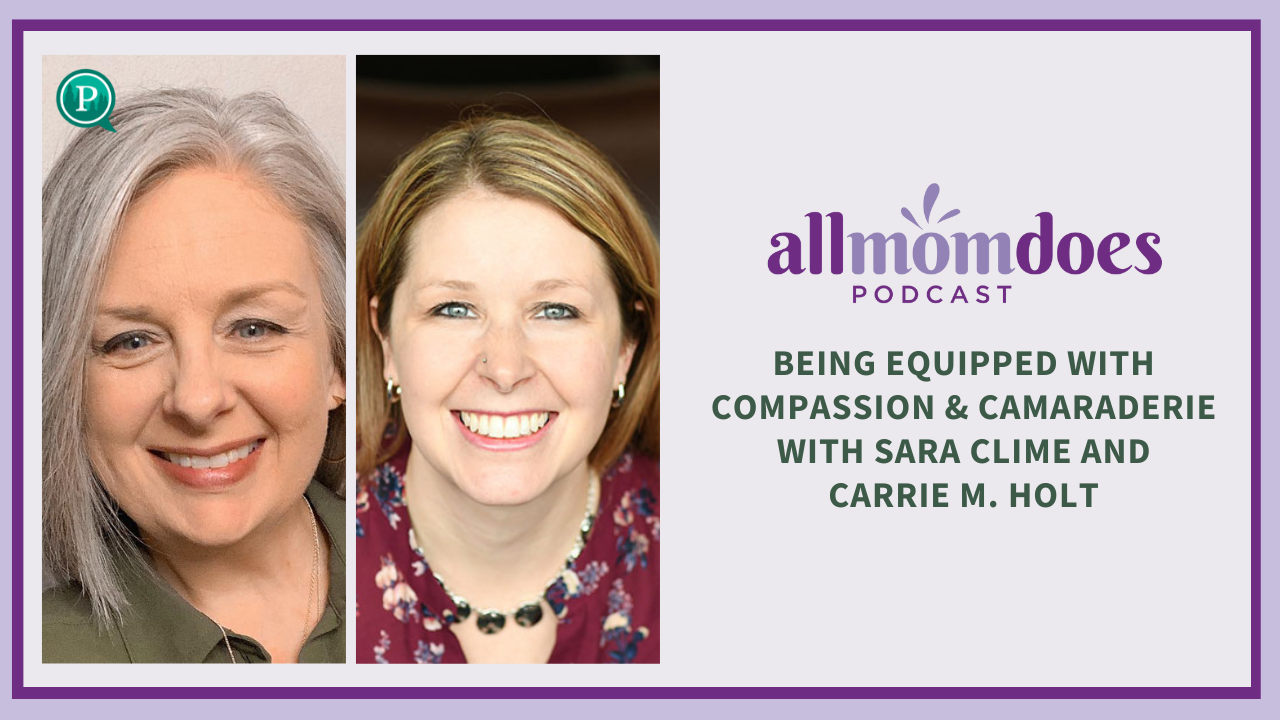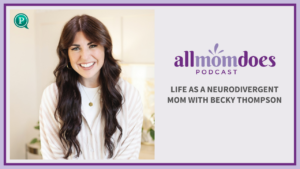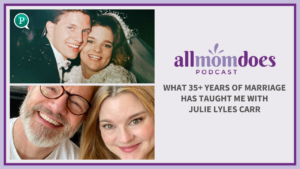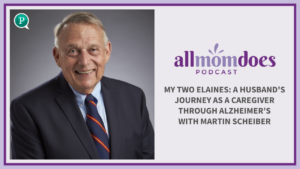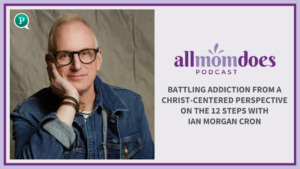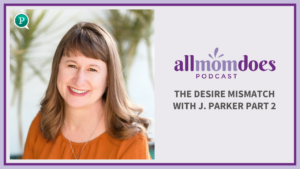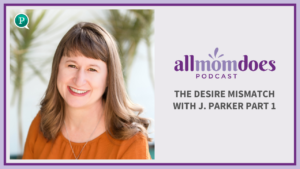Do you feel awkward when you encounter someone who is differently-abled? Have your kids asked questions about a child in their Sunday school class and you’re not sure how to answer? Julie Lyles Carr welcomes Sara Clime and Carrie M. Holt to the this special mini-series on special needs to equip you with tools, compassion, and comaraderie on The AllMomDoes Podcast.
Show Notes:
Find Julie: Online | Instagram | Facebook | Twitter | Pinterest
AllMomDoes: Instagram | Facebook | Twitter
Transcription:
Purposely your life, God’s purpose. Listen at onpurposely.com.
Julie [00:00:15] Have you ever had a moment where you encounter someone and they have a physical difference? Or you can tell there’s something a little bit different about them and you don’t really know what to say, and your kid certainly doesn’t know what to say. You may be in one of those moments as a mom where your kid then asks something kind of loudly and you just freeze up, you don’t know what to do. We are in a mini series that is very dear to my heart about how to navigate well and how to be compassionate and kind and thoughtful and curious when it comes to those who are considered differently abled or with those who are medically fragile. And as part of this mini series I had my daughter Mercy on. If you missed that episode, be sure and go back and listen to it. Mercy is 15 and I think she’s amazing and she has cerebral palsy. She talked about her experience with that. We also had Gillian Menifield on where she talked about her son and the journey that she’s been on with him. And today I’m really excited to have a couple of different guests on. I have Sara Clime and I have Carrie Holt, and they are going to be chatting with us about how to include people who are differently abled or have challenging stories to us. We don’t really know how to navigate. They’re going to help us talk through that, know how to equip our kids and share their own experiences with their own kids. So thank you so much for being here today. Sara and Carrie.
Carrie [00:01:34] Thank you for having us.
Julie [00:01:36] It’s great to have you all. Y’all have worked together on a new book called The Other Side of Special. And you also have a friend named Amy Brown, who you wrote with as well. And I think this is just fascinating to have this collaborative project. How did you guys begin this idea of all getting together and creating a book? Sara, What was that process like?
Sara [00:01:55] Well, we actually met each other early 2020. We met in a writers group and we did not start this project with this in mind. We started as individual writers. We started with separate dreams and we quickly found out that we all had children with special needs and disabilities, and we were sitting around in a burger joint in California and each one of us have children with vastly different needs, vastly different disabilities, and our journeys looked extremely different. But one thing that was the same was that we all had the same feelings. We all had the same needs and we were struggling with the same things. Really when it came right down to it as a mom that we had, even though I didn’t know what it was like for Amy to raise a child with behavioral issues or the adoption journey, she didn’t know what it was like. She has said all along with Carrie and I, we have we’ll share stories about what it’s like to have a child in a wheelchair and people parking in those blue lines and that how frustrating it is. She had no idea. But the underlying feelings of jealousy and anger and confusion and guilt and all of those feelings that come along with it, of being a mom, that your dreams are different, those are the same. And we just bonded over that. And we just knew that other moms needed to know that they weren’t alone.
Julie [00:03:33] Right. I love that you point this out, because definitely one of the things that I’ve found through the years, I myself did it. I still do it even with kids, with kids who are differently abled. It’s so easy to sort of want to lump the parental experience all into one type of thing where, “Oh, well, if you have a kid who’s experiencing this and you’re probably also an expert or have some clue about this, that the other” just kind of like is as there’s some package that you get at the beginning. Of course, that’s not the truth. But I love that you identify that a lot of the feelings can be very similar and some of the challenges that you encounter can be very similar. And that’s a basis for connection with other parents who are walking this particular journey. Carrie, for you, what were some of the emotions that you really wanted to explore? Where did you feel this sense of camaraderie? Because I love that Sarah brings up a sense of jealousy, of anger, of things like that. I have to say sometimes to give voice to those type of emotions when you’ve been called into this kind of journey with your kid can seem a little verboten. So for you, what was that like to be able to start discussing those emotions? And then what was it like once you kind of went public, if you will, with those emotions?
Carrie [00:04:46] Well, I think for me, just in my experiences, especially as mom has just been, sometimes there’s just this a little bit of underlying competition of like my child’s journey is just harder than yours or my child’s situation is more difficult than yours. Or on the opposite side, you’re looking at other moms and saying, I wish my child didn’t struggle like that child does even in the specialist community. I think it’s true across motherhood in general, but I also think it’s true in the motherhood journey of being a mom to differently able child. And so for me, I believe that some of the emotions that I have pushed into…And it’s hard, but is the grief. I think that’s one thing that is very difficult to talk about, but so important because it was so earth shattering to me when my son was five and I finally realized that…The grieving journey was going to be an ongoing part of the journey, and you’re kind of somewhere in that cycle. And that doesn’t mean that it’s linear or that you’re not experiencing more than one emotion at the same time, but just that being able to name that I’m feeling this today and I might be in denial or, you know, my son, 16, and all of his friends are getting their driver’s license and I’m kind of angry and upset about that today. And that was just very eye opening and freeing for me.
Julie [00:06:26] I love that we’re able to talk about this because it does feel like to me I have experienced people in my life. I’ve done it to other people where we have this hero mythos in a sense that if you’re walking this journey, somehow you have been morphed into Mother Teresa and you have all the capacity and emotional capacity you need to be able to do this. That’s simply not the truth. I think that’s one of the things that is critical for people who say, “Well, I don’t have a child who’s differently abled, but I want to be a good friend. I want to be a good support system to someone who does.” I think this is something that’s really important to note, is that, you know, of course it makes sense when you hear it, but for some reason we respond a lot of times emotionally to those who are in difficult challenges and seeing them surviving it by going, “wow, look how amazing in their hearts are so benevolent.” But to give room, to give voice to some of these complicated emotions that come when you have a child who is differently abled. I can remember myself, I think I’ve written about this a couple of places, but when we got one of my daughter’s diagnosis with hearing loss. The first thing that went through my head and Sarah and Carrie, this makes zero sense. But the first thing that went through my head was, is she going to have to wear hearing aids to prom? Like, why? It’s not exactly terribly noble. I’m like, “Oh, that was the first place my brain went, Wow, Jules, that is wow.” So you can’t always account for the journey emotionally that you’re going to be on in the weird stuff that you ask yourself and those kind of things. Now, Sarah, I know that one of the things I was unprepared for when I became the parent of a child who was differently abled is in addition to the fact that we oftentimes put on parents who are walking that journey a sense of nobility. I think when you become a parent in that situation. My initial assumption because my response to people who I knew who were walking that journey was one of compassion of how can I help? How can I make your kid feel included? I really thought that’s how everybody would respond to my children. I really thought, Oh, we’re all a community and everybody’s going to want similar opportunities for all of our kids. And I was wrong. I was real wrong. And I discovered that there were people who didn’t want my child in their child’s dance class because she was going to mess up recital and they were four. I learned that there were people who felt like that maybe my child shouldn’t be in the same Bible class. I learned that there were…I mean, I was unprepared for that. So, Sarah, what is your experience been did you go in assuming that your child would be included and discovered the level of exclusion? Have you had a better story? Have you found inclusion and community? Where are you at?
Sara [00:09:16] I have experienced all across the spectrum. Honestly, yeah, I have experienced where people were scared to have us. And I think our story is one where my son was diagnosed at the age of eight,. So for all intents and purposes, we had this quote unquote healthy baby boy until eight and we just put him in physical therapy and all of a sudden, oh, he’s terminal and you have X number of years left. And so it was just this shock to the system. I think our diagnosis made our friends very uncomfortable because all of a sudden it could happen to them. It was a mirror to them that. “Wait a minute. He was healthy yesterday because he didn’t look sick. He didn’t. It wasn’t this gradual thing.” It was just, you know, one thing. So I think in that regard, we had did make people very uncomfortable. And then all of a sudden he couldn’t go up steps. All of a sudden, he couldn’t do things and people didn’t understand that. “Well, yesterday he could, what do you mean, today he can’t. What do you mean? And it was. Are you are you all of a sudden jumping on this special needs, quote unquote, bandwagon? Now all of a sudden, you need all of this special treatment.” And not everybody was like those were few and far between, but they’re still hurtful. And those people tend to speak louder in certain instances. And it tends to be you are messing up their good time, I guess. You know, it’s like, “We can’t have the children’s class in this room because my son can’t access it.” “Well, but that’s the fun room. That’s the room that they’re looking forward to. So we’ll deal with that when they when we get to it. Or we’ll change the class eventually.” “Well, no, my son can’t get in there”. So it’s just it’s almost like, “Well, your son’s messing things up now. Like you said, it’s like your son. You know, your daughter’s messing up the dance recital.” It’s not that, it’s inclusion. And so, yes. And then there’s the other side of the spectrum where it’s he’s almost like the the token disabled child’s. And I hate that term. It’s not he’s not the disabled child. He’s a child with the disability. There is a difference. But that’s what it is. It’s almost like now where. Well, can I get a picture of I’m sorry, I can put it on my social media and so I can now, because he’s a senior in high school, he does have some wonderful friends that are not like that and they do not treat him that way, that they are like, no, we’re not putting him on social media. We we just want him to be a part of the soccer team. And we’re not putting him on our social media because of that. So it’s wonderful. So we do have we do have that spectrum, but. It’s exhausting trying to keep up.
Julie [00:12:22] It’s complicated. It’s really complicated. You know, we started a nonprofit that gave dance opportunities, dance training and dance performance for individuals who are differently abled. And we did over time have particular dance competitions that included our team, and they were brought in for competition. We had some really beautiful support from a lot of places, but it was also difficult because we it was very important to us to also start a company that a dance company that had both typically abled neurotypical and dancers who are differently abled and different neurotypical. And that was a little bit tougher to get through the door. To your point, it was sort of it was nice and kind and lovely and a little tear jerker to have these kids who were differently abled in their little group that we could roll out. And everybody wanted the pictures and wanted to feel good about themselves. It was different to say, How about if we accepted the way different bodies move and different people, you know, interact and create this art as a mixed, if you will, which a strange term, but if you will, as a mixed team. And that was where I began to find a little more resistance at times, a little more of a line, which again, I was so naive. I was like, “What? What do you mean?” So Carrie, what has been your experience in terms of trying to include your child and where have been some places that you found some resistance, Where have been places that you maybe were surprised, where you found a lot of openness and engagement?
Carrie [00:13:57] The place that I have found resistance has I’ve been homeschooling for the last ten years. I’ve had a little bit of an experience with both. But a lot of times it’s the resistance because a lot of times people feel like they’re ill equipped or they just don’t understand. So. I can remember years ago being part of a homeschool group and, you know, all the parents had to volunteer so many times that month. And the one day I was supposed to volunteer, I was actually in an ambulance on the way to the hospital with my child, texting people to fill in for me, because the lack of understanding by the leaders of I just wasn’t trying to get out of this, you know, responsibility. I was actually in the middle of a medical emergency, and I think I was just shocked by the lack of grace and understanding. And secondly, sometimes to I think it’s just that. People don’t want to hear about the difficulties and the muck of life. So it’s if you’re trying to share about a hospital stay or a surgery or something. And I think this happened so many times where they’ll go, “Oh, yeah, but look at him now. He’s fine. He’s doing great.” This happened to me yesterday, and I just thought I realized that he’s overcome a lot, and we’ve come really far. But what you’re doing is dismissing all the pain and all the trauma that he’s been through. Our family’s been through. And I think sometimes it’s just hard for us to be initially like jobs friends, where we just kind of sit in the ashes together and grieve. And I think that’s just really difficult. On the other hand, we have had like one really great experience at church where…So we had we moved away from where we had previously lived and we were venturing into a whole new world of meeting people that knew us after our son diagnosis, whereas the previous church, they knew us before we were young marrieds, we had two kids, and then our third son with his needs came along. And I remember just thinking, I’m walking into these churches and they’re looking at me thinking, “Oh man, what are they going to need?” You know, like, “What are they going to ask of us?” And the church where we finally ended up, the children’s pastor at the time had grown up next to a girl who had the same diagnosis as my son. And he just had a heart. Still does has a heart for my son and has a great mentoring relationship. And they have found places for him to serve in the church. And I think that that part of inclusion is so important because he needs to know that he’s not just taking, but that he can also give and serve and be an integral a part of that community.
Julie [00:16:57] Carrie I love that because I will say I have seen faith communities who have responded to congregants who have special needs in such a powerful way. And I’ve seen churches who frankly have been terrible. And I’m just going to put it out there really bluntly. I mean, really bad, really exclusionary and some really poor attitudes seen both ends of that. One thing that I don’t know that I’ve seen done well is on either side is a place for people to be able to contribute regardless of what their challenge might be. And I live in a community. I’m in Austin, Texas, and one of the things that I love, my neighborhood grocery store employs a lot of people who are differently abled. And I’ve gotten to know a lot of them. And it’s just been really powerful. I thought, this is what the church should look like. Like why doesn’t the church look like this where we’re always begging for volunteers, Right? Well, why aren’t we providing opportunities for people who are differently abled to be very visible, very in the mix, and very much part of the fabric of the community? How do you think, Sarah, we can do a better job in our churches of creating inclusion? And part of the reason I ask this is of those churches that I think are actually even open to working with this. I’ve seen a couple different models that I understand. I don’t know if it’s where we really want to get to. One is, “Oh, we have a special needs class.” Now to the point we’ve all been talking about. We all have children who fall under the label of differently abled, but our kids are vastly different and their needs within that are completely different. And so if you have a child who is neurotypical but has physical differences, they’re going to have different needs than a child who has no challenges. And so I’ve either seen faith communities who have their special needs class where everybody who’s differently abled are supposed to go, which is an interesting approach. Or I’ve seen communities where they’re pulled in but kind of segment it off or I’ve seen a couple of different iterations. Sarah, what to you looks like a powerful opportunity, an honoring community for those who are differently abled when it comes to children’s ministry? And here’s here’s another big one and youth ministry. I know that’s a can of worms that do we even take the lid off that. But Sarah, just jump in. Just tell me what you got.
Sara [00:19:28] Well, actually, our church, my myself, my husband and another couple, we started a ministry of disability and special needs ministry for in our church and our leadership. When my son was diagnosed, this other couple, they had twins actually, that were born. One passed away in utero. The other was born with cerebral palsy and all of this happened. My husband and I, our son was diagnosed and their children were born probably around to two weeks apart. And our church just surrounded us with love. And the leadership came, the elders, the staff, everybody came. And the best thing that they told us was, “We have no idea what to do. This is not something we’re familiar with. All we know is we love you and we know we want to help and we know we’re going to fail at this. So just. Help guide us. We don’t want you to hold our hand. Just help us…How do we figure this out? How do we help you?” It wasn’t like, You just let us know when you need something, right? It wasn’t kind of like, “We’re just going to be over here waiting for you to tell us what what you need.” It was. “How do we help?” And we went to them with a plan. And so we started a ministry. It’s a buddy program, actually, what we did. And our children. It’s birth to death. And it is an outreach. We outreach to the community. And it is we bring anybody in and anybody can serve. But everybody goes through a background check because some of our children are nonverbal and they are absolutely protected to make sure that they are not in harm’s way, but they are integrated in whatever age group that they are in. We have the parents tell us what the children love, what they are good at, what makes them awesome, what makes them stand out. And then they have a volunteer and then they have buddies with their peers that are kind of paired up with them as well, and they participate in whatever they have. We also have a sensory room that we can kind of bring them if they get a little overloaded. But what we have found is their peers are their biggest advocates. So if we have somebody that’s visiting the church that says, “Well, children are the they’re just going to tell you what’s exactly on their mind, Like, what’s wrong with her? Why are her legs like that? Why are her arms like that?” And people ask my son, my son’s in a wheelchair and they’ll you know, children will say, “Well, what’s wrong with his legs?” And parents to me, like, “Don’t look at him. You don’t do that.” That’s like the immediate thing. And so I’ve learned to be like, “You’re so perceptive. You notice something different about his legs.” And so just not to, you know, tell the children to be quiet. But the children in our classrooms and not in our Sunday school classrooms and our children’s church, they will sit there and they’ll be like, “Well, her name is, and she has…” And we teach the children what their diagnoses are, what they can do, what makes them special. And they’re their biggest advocates. You just don’t don’t shy away from it. It’s kind of like you don’t I know what color my hair is. I know that I’m not 6’1. I know I’m not a model. So, you know, you’re not going to surprise me by telling me that I’m not, you know, blond hair. So it’s we know that it’s not a surprise, so. I teach these children how to advocate for these other children. And if they grow up with these children, knowing that it’s going to be it’s going to be common. And we tell them, you can go into your schools then, and if you see a child, then, you know, just because they don’t speak, you know, you see Susie here and you know that she doesn’t speak at school or at church. Well, then if you see Bobby at school, you know that then he can hear you say hi to Bobby. So it’s kind of we’re teaching them maybe that it’s not just this 45 minutes at church. Go out into the community and say hi. So it’s working. Is it perfect? No, because we’re learning, too. I mean, just because we’re parents with children with disabilities, I don’t know everything there is to know. I’m learning so much about Carrie’s child. It’s we’re all learning.
Julie [00:24:00] I think that’s the gold standard, honestly, the buddy program, if you will, or that system, and we use that within the nonprofit. We had to Dance to Dream. And then it was something I helped introduce at a church that I was part of for a while, a buddy system in that way. And for those parents who are listening, who are saying, “Well, but what if what if a child like that becomes disruptive in Sunday school or whatever?” And I would say Jesus was all about the disruptors. Jesus was all about going to the people who were different and who didn’t always fit cleanly into what the Pharisees and the Saducees would have liked. And so your child having the opportunity to experience disruption in this way is so incredibly powerful can be an incredible moment in their spiritual growth. And to your point, Sarah, those kids who became buddies, to a lot of the people we were serving in to Dance to Dream, and also within some church programs that we helped with. I saw so many of those kids find their life’s passion. I wish I had the number that I could just easily give you, but I would say probably 70% of a lot of the people who came through our programs as buddies ultimately went into PT, OT, SLP…I mean, it was incredible. If you have a kid who’s looking for their path in life and if you’re worried about your kid feeling entitled, if you’re worried about your kid not understanding what it means to give back or to care about some things in a different way, find a faith community that has this type of buddy system. I’m telling you, it can be absolutely life changing for your child. Carrie, how do you navigate and how do you advise parents to navigate? I love Sarah’s advice about just saying don’t shut down a kid who’s seen differences. My daughter and I who ran Dance to Dream, one of the things that we often talked about was we were giving people permission to stare for a little bit. That’s a normal human response. It’s okay to notice differences. It’s what you do on the other side of that staring that becomes really critical. So. Carrie what are some things that you would add on to what Sarah said about equipping our kids to be very honest and curious about differences? And where do you advise the line is to then it becoming something that gets rude or weird or odd?
Carrie [00:26:22] So I think it’s important to start when your kids are younger, and I feel like now we have even more resources with books who have kids in wheelchairs or braces and things like that. And I think it starts when our kids are younger and reading them stories who have kids who don’t look like them. And so it’s not this shocking thing. And when they’re out in the community or at school or in those types of situations. I think the other thing that is especially important, I think, in the teen years is teaching your child to be a friend, like a real friend, not just be…I invited this person at school to the homecoming dance because I wanted to get the homecoming king, you know, and to look good in front of other people, but to be a true friend. And I know that’s really hard for this age. One thing that I’ve noticed with my own son is there are kids who are pretty a little bit older than him. Three or four years are really good at that, or kids who are a little bit younger. That kind of middle teen age 14, 15, 16 can be difficult, but I think there are certain families that have done just a really good job of teaching their children to see our kids as people first and that they that they have likes, they have dislikes. And so I think that it’s having those open conversations with our children about, Hey, do you see how we over there? Let’s look past this wheelchair. Maybe he has a favorite Star Wars character or he really likes this football team or whatever it is. I think it’s finding that common ground. And I, I can tell you that in the early days when people were staring, that I would get so greatly offended. And, you know, my skin gotten a little thicker through the years. But I, I think it’s that ability of us being open to the questions and obviously having some kind of boundary if they’re getting really personal or, you know, and obviously each family just has a different level of their desire of sharing their personal lives. So I think we have to respect those boundaries and things like that. And yeah, I just think it’s really important to ask good questions and just not make assumptions to go into situations and say, you know, I love it when people ask us questions. I love it when they talk to him directly, not just me. In the medical setting I think that’s huge and my son’s verbally able to communicate with people. And so I, I think it’s just really important that we are seen because that’s the heart’s desire of all of us as humans. And that’s especially true, I think, in groups where we’re more isolated.
Julie [00:29:20] Absolutely. That ability to see people, I think is one of the things in our faith communities that if we can exemplify that, if we can show people that they’re seen and known and appreciated, that’s gospel right there. I mean, like that is really doing it for them. And, you know, one of the things that I am going to get on my I’m going to get on my little soapbox for just a minute. But if you are really sincere about wanting to reach others for God, let me just throw some stats at you. So about 16% of children ages 3 to 17 in the United States have a diagnosed disability. You throw in their medical needs. On top of that, we’re probably hitting somewhere close to 20, maybe even over 20%. And yet we are not in intentional ways seeking out those families in our communities. We are funding all kinds of missionary trips to this place in some kind of inner urban whatever over here. And those are lovely. But at the end of the day, what is your church community immediately doing in your neighborhood, in your range of zip codes to specifically reach out to families who have children 20%? What are you doing to reach out? Are you willing to be inconvenienced by this? Are you willing to make this a true heartbeat? Because one of the things that we definitely found, to your point Carrie, the isolation of a lot of these families, the sense of not feeling welcome, the sense of being a burden. And so we have a whole lot of people who so could use the support and love of a community, and that community could use the support and love of those families. And we’re all missing out. And so, I’m so thankful you guys made time today to come on to be willing to talk about this. And I love that you’ve put this book together. I want to give the listener those details. Again, the book is called The Other Side of Special Navigating the Messy, Emotional Joy Filled Life of a Special Needs Mom. And where can readers find out more about you? Sarah, where are you on all the socials and Carrie where are you? We”ll start with Sarah.
Sara [00:31:26] Well, you can find us at Takeheartspecialmoms.com and we are on Instagram @TakeHeartSpecialMoms and on Facebook Take Heart Special Moms. And we have all of our individual handles there as well. So you can find Amy, Carrie and I there.
Julie [00:31:41] Fantastic. We’ll get that into the show notes. And again, Sara Clime, Carrie Holt, thank you so much for being with me today. Really appreciate our time together. And be sure you’re following Allmomdoes.com for all kinds of information and inspiration for the life that you’re living. And I love it when you come over to the socials and you get into my DMs and we get to have conversations. You can find me @JulieLylesCarr on all the socials. Typically, I hang out the most on Instagram, so come see me there. Hey, do this for me, if you would, as a special thank you to Sara and Carrie, would you please go and like and subscribe and send a link for this episode and all the things when you do that, when we see that you’ve really engaged with an episode, it’s a huge thank you to our team, to our guest. And also you’re sending out a lot of good, great information into the world that can really help somebody. So thanks so much and I’ll see you next time on the All Mom Does podcast.
Follow this podcast:

